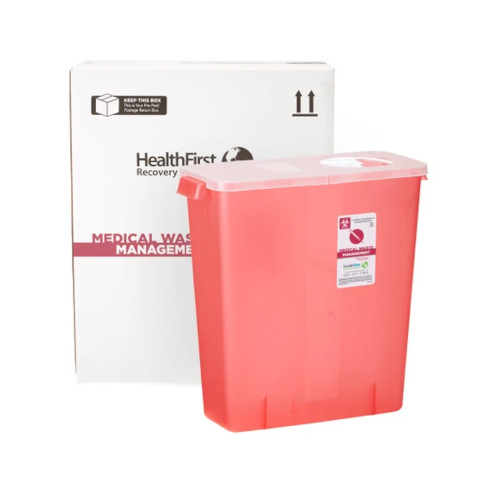Navigating Safety: The Important Guide to Medical Waste Disposal Best Practices
Navigating Safety: The Important Guide to Medical Waste Disposal Best Practices
Blog Article
Recognizing the Various Kinds Of Garbage Disposal Techniques
In the world of waste administration, the variety of disposal strategies available today is large and varied, each method offering a distinct function in dealing with the obstacle of garbage disposal. click here. From recycling methods that intend to offer brand-new life to materials, to the complex procedures of hazardous waste administration, the landscape of garbage disposal is intricate yet essential for environmental sustainability. Recognizing the nuances of these different methods not only drops light on the relevance of responsible waste management however likewise motivates us to reassess our approach towards waste disposal in a rapidly progressing globe

Recycling Methods
Recycling approaches are critical for lasting waste administration practices in both industrial and residential setups. medical waste removal near me. By executing efficient recycling strategies, a substantial amount of waste can be drawn away from land fills, conserving natural deposits and lowering the environmental impact of manufacturing procedures
In property areas, curbside recycling programs play a crucial role in motivating homes to different recyclable materials from basic waste. Materials such as paper, plastics, glass, and metals can be arranged and collected for handling into new items, decreasing the demand for basic materials and energy-intensive production procedures.
Industrial facilities additionally rely on recycling approaches to reduce waste generation and advertise a round economic climate. By applying closed-loop systems, companies can recycle materials within their production procedures, reducing expenses and ecological impact. medical waste disposal. Additionally, commercial recycling programs often include collaborations with specialized recycling facilities to ensure that materials are effectively sorted, refined, and reintegrated right into the supply chain
Composting Methods

Oxygenated static heap composting includes mixing natural waste products in a large heap and consistently transforming it to guarantee correct oygenation. This method is reliable for massive composting procedures. On the various other hand, vermicomposting utilizes earthworms to damage down raw material into nutrient-rich spreadings. This method is well-suited for smaller-scale procedures and homes.
In-vessel composting includes placing organic waste in a closed container with regulated problems for temperature level and aeration. Windrow composting includes forming long rows of natural waste and routinely turning them to promote decomposition - medical waste removal.
Landfill Disposal
Landfill disposal is a generally made use of technique for managing waste that can not be reused or composted. Methane gas, a by-product of decomposing natural waste in landfills, is commonly accumulated and made use of as a resource of sustainable energy. Initiatives to lower reliance on garbage dumps consist of promoting waste decrease, reusing, and discovering different waste disposal methods to reduce the environmental footprint connected with typical landfill disposal methods.

Waste-to-Energy Incineration
Incineration of waste click here for energy generation is an approach increasingly being taken into consideration as an option to traditional landfill disposal techniques. Waste-to-energy incineration involves the burning of waste materials at heats, usually in specialized facilities developed to create electrical power or warm via the process - click here. This method not only minimizes the volume of waste that would otherwise be predestined for land fills however additionally utilizes the warm created throughout incineration to create power
One of the essential advantages of waste-to-energy incineration is its capability to produce electrical power while decreasing the environmental influence contrasted to standard landfill disposal methods. By transforming waste into power, this strategy aids in decreasing greenhouse gas emissions and dependence on nonrenewable fuel sources for power generation. Additionally, waste-to-energy centers are geared up with advanced air pollution control innovations to minimize possible toxic wastes released during the combustion procedure.
Hazardous Waste Monitoring

Considering the crucial relevance of accountable waste management practices, particularly in the world of environmental sustainability, the emphasis now changes in the direction of the detailed domain of Hazardous Waste Administration. Contaminated materials positions substantial threats to both human health and wellness and the setting, requiring specialized handling and disposal methods. Common instances of harmful waste consist of chemicals, batteries, pesticides, and electronic waste.
Hazardous Waste Administration involves the identification, collection, transport, treatment, and disposal of products deemed potentially harmful or unsafe. This procedure requires adherence to stringent laws and standards to alleviate negative effect on environments and public wellness. Different techniques are used in handling dangerous waste, consisting of recycling, protected land fills, encapsulation, and chemical treatment.
Proper Contaminated Materials Monitoring is crucial for avoiding contamination of soil, water sources, and air contamination. It is essential for industries, research laboratories, health care facilities, and various other generators of contaminated materials to carry out durable administration strategies, training programs, and emergency reaction plans to ensure the secure handling and disposal of these materials. Failure to handle unsafe waste properly can have significant effects, underscoring the importance of persistent and responsible techniques in this area.
Final Thought
In conclusion, waste disposal techniques play a crucial function in managing and reducing the impact of waste on the setting. It is essential for individuals and sectors to recognize the various waste disposal strategies offered and pick the most proper technique for lasting waste monitoring.
In the realm of waste management, the variety of disposal techniques readily available today is large and differed, each technique offering an unique purpose in attending to the challenge of waste disposal. click here. From recycling methods that intend to give new life to materials, to the intricate processes of unsafe waste administration, the landscape of waste disposal is intricate yet essential for environmental sustainability. Understanding the nuances of these different techniques not only sheds light on the importance of responsible waste management however additionally triggers us to reconsider our approach in the direction of waste disposal in a quickly developing globe
Initiatives to lower dependence on garbage dumps include promoting waste decrease, recycling, and checking out alternate waste disposal approaches to decrease the ecological footprint connected with standard garbage dump disposal practices.
It is vital for people and markets to recognize the different waste disposal strategies offered and pick the most ideal approach for lasting waste administration.
Report this page